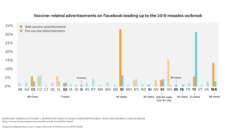Across the country, evidence-based vaccination policies are under political attack. For example, requirements that children be vaccinated against diseases like measles, mumps, and rubella to enroll in public schools are widely endorsed by public health experts, as they have played an important role in promoting high levels of vaccine uptake. High levels of vaccination in turn decrease the likelihood that Americans contract these preventable illnesses and protect immune-compromised people who cannot vaccinate.
That could be about to change. Lawmakers across the country are taking action to weaken vaccine mandates. For example, dozens of Republican attorneys general blocked the Biden administration from requiring COVID-19 vaccination in private companies that employ 100 or more workers. Others have taken aim at vaccine mandates more generally, such as an Idaho state senator who recently introduced legislation that would classify vaccine mandates as a form of assault.
Politicians are not fully to blame for these legislative actions. Those who make an effort to weaken vaccine mandates may be responding to conservative constituents’ discomfort with vaccine mandates, which may reflect preferences for individual liberty and aversion to the role that government plays in everyday life. Increasing public demand for robust vaccine mandates is therefore an important health policy goal.
Changing minds, however, is quite difficult.
Americans’ opinions about vaccination are shaped by deeply-held political beliefs. In fact, some studies suggest that partisan identity is the single best determinant of whether or not Americans choose to vaccinate. Vaccine attitudes are therefore difficult to change, as changing minds about vaccination may violate one’s political convictions.
However, past research (including work I have done with colleagues) suggests that convincing voters to accept vaccination is easier when endorsed by Republican politicians. Americans tend to place high levels of trust in those who share their political views. Correspondingly, pro-vaccine messaging from Republican elites – such as Senate Minority Leader (and polio survivor) Mitch McConnell – offers conservative voters the opportunity to change their minds about vaccine mandates without challenging their partisan identities.
By failing to actively promote evidence-based health policy, Oz and others perpetuate an opinion environment that supports lawmakers who aim to weaken vaccine mandates.
Instead, we get politicians like Dr. Mehmet Oz. A celebrity doctor whose popular day-time television show often gave a platform to guests who promote anti-vaccine views, Oz shifted course in 2019. In response to a 2019 measles outbreak in upstate New York, he devoted an episode of his show to encouraging Americans to have their children vaccinated. And his viewers followed his advice.
A study I conducted with colleagues at the Annenberg Public Policy Center documented impressive shifts in beliefs about the measles, mumps, and rubella vaccine. Those regular Oz viewers who knew the least about the benefits of vaccination came to hold significantly more positive views toward vaccination after the airing of that episode than they did in the previous weeks and months.
Now that Oz is the Republican nominee for a U.S. Senate seat in Pennsylvania, he continues to muddy the conversation about vaccines. While continuing to support vaccinating against COVID-19, he has spent his time on the campaign trail launching personal attacks on Dr. Anthony Fauci. This led a group of physicians in Pennsylvania to label his candidacy as a “threat to public health.”
Our research raises the possibility that his campaign has enormous potential to change how Republicans view issues related to vaccination. Instead, he appears to be, as we noted in a recent Washington Post op-ed, throwing away his shot. Oz has an incredible opportunity to reduce vaccine hesitancy on the ideological right, yet his campaign has largely avoided engaging in pro-vaccine messages.
To be sure, Oz and most GOP candidates for elected office are not taking overt action to undermine vaccination efforts. However, by failing to actively promote evidence-based health policy, Oz and others perpetuate an opinion environment that supports lawmakers who aim to weaken vaccine mandates.
America needs vaccine champions on the ideological right. Standing by, while GOP lawmakers erode evidence-based vaccine policy, could have grave consequences for public health.
Photo via Getty Images














